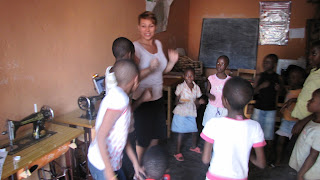On Sunday we held the long awaited workshop on healthy
nutrition. Why do we need it, you ask? Well, even though the food here is
delicious and locally grown, with few artificial ingredients, the people here
seem to like fried food, mayonnaise and a lot of sugar in their tea. Also,
large portions are the norm.
So, our task was to educate the members on some simple rules
of healthy nutrition and put the knowledge into practice. On Sunday we started
with a brief presentation, followed by the actual cooking. The ladies gathered
in the backyard and started peeling potatoes, slicing carrots and tomatoes and
our cook Aminatta put all the ingredients together, using as little oil as
possible and cooking instead of frying. When the food was ready we invited
almost 40 local children to our backyard and served them the food – rice, meat
and lots of vegetables. The kids were on their best behavior and surprisingly
quiet – probably because they were eating. After the meal we served fresh
fruits and milk.
All in all, the workshop seems to be a success, though only
time will tell if the members really start putting their knowledge into
practice.











